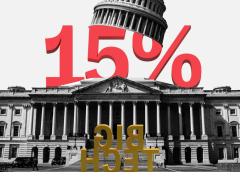
What the 15% corporate minimum tax means for tech
[ad_1]
When President Biden signed the Inflation Reduction Act into law on Wednesday, he put in place a 15% minimum tax rate for all large U.S. corporations.
The long-awaited corporate tax reform should in theory be a big deal, but markets hardly flinched after it became clear the legislation would pass. And tech companies — which pulled out all the stops to hinder Sen. Amy Klobuchar’s antitrust bill — hardly resisted the measure, even if their interest groups dutifully issued statements of opposition. Tim Cook didn’t swing by D.C., there were no mass fly-ins and no casting calls went out for the part of Joe America in stilted political attack ads.
So why didn’t the tech sector fight harder against a law that Democrats say hits them where it hurts? Mitchell Kane, a tax professor at New York University Law School, gave Protocol three possible explanations: First, the deal came together too quickly for corporations to react. Second, the incremental tax cost could be little to nothing. And third, corporations may have preferred the 15% plan to something worse.
The deal did indeed come together quickly, as Sens. Joe Manchin and Kyrsten Sinema decided at the last minute to support a bill that many had already written off as dead. This timing played in corporations’ favor in some ways, since it forced progressives to give up on more ambitious plans to raise the corporate tax rate to 28%.
It’s also true that many tech companies will feel no impact from the new minimum. An analysis from the Joint Committee on Taxation found that only around 30% of the Fortune 500 will be impacted by the new minimum tax, and those companies are concentrated in industries such as manufacturing. Meta, Microsoft and Apple all paid more than 15% cash effective tax rates last year, according to a Washington Post analysis. Overall, the new minimum is expected to raise corporate tax revenue by less than 5% within the next decade.
Companies make two calculations under the new minimum tax system. The first is the standard taxable income calculation that allows for all the existing deductions. The second calculation, which sets the new minimum, starts with the financial statement income — what a company reports to the SEC and investors — and allows for adjustments including research and development costs, accelerated depreciation and climate investments. If 15% of the second calculation isn’t larger than the original tax calculation, then corporations must pay a top-up tax to ensure they’re meeting the minimum threshold.
Even tech companies currently paying tax rates below 15% could be in the clear. The allowances have the potential to give considerable offsets to tech companies, especially for R&D. Companies such as Nvidia and Intel both paid estimated cash effective tax rates below 15% in recent years, but their businesses also require exceptionally high R&D costs. Those costs can still be deducted under the new plan.
R&D deductions are particularly beneficial for companies since the benefits last a long time and the resulting intellectual property can often be transferred offshore to avoid U.S. taxes. It is precisely this upside that many critics say is unfair: To put it simply, the U.S. tax policy allows companies to deduct R&D expenses and also later to shield much of the subsequent revenue.
Nixing the R&D deduction was never under consideration, according to Reuven S. Avi-Yonah, a law professor at the University of Michigan who advised Sen. Elizabeth Warren on the Real Corporate Profits Tax Act introduced last year.
“It’s the international part that I find interesting,” Avi-Yonah told Protocol. “What we have here is essentially a tax on their global profits at 15% because for book [accounting] purposes you include all their foreign operations in one big pile with their domestic ones.”
The biggest open question for tech companies is whether stock-based compensation will be allowed as an offset for the minimum tax calculation. In 2021, for example, Amazon paid out $12.8 billion in stock-based compensation, allowing the company to reap $2.7 billion in tax benefits.
“The biggest difference for many tech companies between their taxable income and their book income is stock option gain,” Peter Barnes, counsel to D.C. law firm Caplin & Drysdale, told Protocol. The stock option gain can be deducted from taxable income, Barnes explained, even as it doesn’t count against book income. Corporations have long argued that the government should support the deduction because it encourages good corporate behavior, aligning the interests of employees and owners.
The Inflation Reduction Act contains no mention of stock-based compensation, but that doesn’t necessarily mean it won’t be included. The IRS and Department of Treasury’s Office of Tax Policy will likely spend several years translating the legislation written by Congress into the tax code.
“They changed the law significantly in 2017, and it took the IRS three [or] four years to come out with the detailed regulations on most of these things,” Avi-Yonah told Protocol. “For this one, I think it will take at least as long because, conceptually, it’s a really different kind of tax.”
This lengthy process gives tech companies ample opportunity to make their voices heard. There will likely even be several rounds of solicitation periods in which the IRS will ask for public comment, present drafts and then solicit more comments. By the time this process gets into full swing, companies may very well be dealing with a Republican-led House and Senate, in turn creating an easier path for winning additional concessions. At the end of the day, though, the new rules only set the minimum — the old rules still matter.
[ad_2]
Source link


